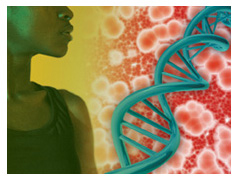 
Diabetes Dateline
Winter 2008
People with Diabetes and Sickle Cell Trait Should Have Reliable A1C Test
Campaign Informs Physicians and Patients

A new National Institute of Diabetes and Digestive and Kidney Diseases (NIDDK) information campaign highlights the importance of using accurate methods to test hemoglobin A1C in people with diabetes who have sickle cell trait or other inherited forms of variant hemoglobin.
The hemoglobin A1C blood test is an essential tool in diabetes care because it shows a person’s average blood glucose level over the past 2 to 3 months. Physicians base their treatment decisions largely on A1C test results. Inaccurate A1C readings, whether falsely high or low, can lead to overtreatment or undertreatment of diabetes.
“In the United States, more than 3,000 labs rely on 20 different methods to measure A1C in people with diabetes,” said Randie Little, Ph.D., who heads the National Glycohemoglobin Standardization Program (NGSP) at the University of Missouri School of Medicine. “However, six of these methods yield unreliable results in patients with sickle cell trait. Health care professionals caring for people with diabetes should know that specific A1C tests should be used in this group of patients.”
The NGSP, supported by the NIDDK and the Centers for Disease Control and Prevention, is working to improve and standardize the measurement of A1C in laboratories around the world. The NGSP website, www.NGSP.org, lists the test methods that accurately measure A1C in patients with hemoglobin variant S, also known as sickle cell trait, and variant C, another common variant in the United States.
Hemoglobin is the oxygen-transporting protein in red blood cells. Mutations in the genes that code for the protein, which occur more frequently in people of African, Mediterranean, and Southeast Asian descent, cause variations in the structure or amount of hemoglobin. Researchers have identified hundreds of hemoglobin variants, affecting millions of people worldwide.
The most common variant is sickle cell trait, in which a person inherits a gene for hemoglobin S and a gene for hemoglobin A, the usual form of hemoglobin. Sickle cell trait affects about 8 percent of African Americans. Having sickle cell trait or another hemoglobin variant does not increase a person’s risk for developing diabetes.
Many individuals are unaware they have a hemoglobin
variant such as sickle cell trait because the condition usually causes no symptoms. In diabetes patients of African, Mediterranean, or Southeast Asian descent, the following situations may suggest the presence of a hemoglobin variant:
- an A1C result does not correlate with results of self blood glucose monitoring
- an A1C result is different than expected or radically differs from a previous test result after a change in laboratory A1C methods
- an A1C result is higher than 15 percent
“If you see a significant discrepancy between a patient’s A1C reading and the results of routine blood glucose monitoring, consider the possibility that your patient may have a hemoglobin variant and find out if your lab is using a reliable method to measure A1C,” advised NIDDK Director Griffin P. Rodgers, M.D.
The NIDDK’s National Diabetes Information Clearinghouse has prepared two new publications to explain the specific needs for testing blood glucose control in people with diabetes and hemoglobin variants: Sickle Cell Trait and Other Hemoglobinopathies and Diabetes: Important Information for Physicians and For People of African, Mediterranean, or Southeast Asian Heritage: Important Information about Diabetes Blood Tests. For copies of the publications, go to www.diabetes.niddk.nih.gov.
[Top]
NIH Publication No. 08–4562
March 2008
|




